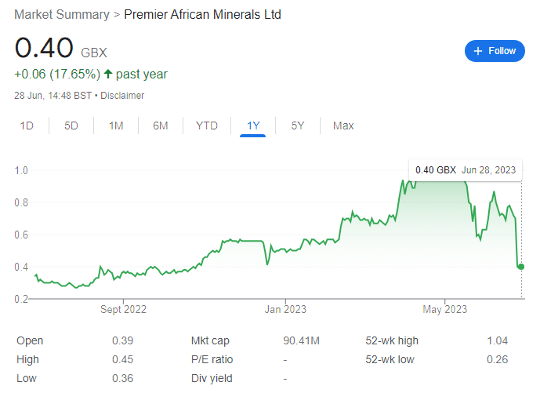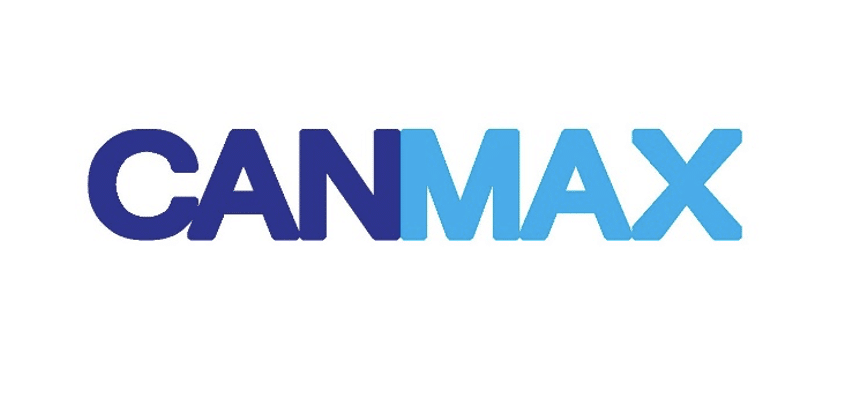PREM investors are at maximum fear stage. High-risk, high-reward cuts both ways; but long term investors will stay the course.

When I first covered Premier African Minerals (LON: PREM) for Investing Strategy on 1 November last year, I noted that penny shares, exploratory mining shares, lithium shares, and African assets, are all high risk — and that PREM has all these bases covered.
Accordingly, PREM was and remains a high risk investment, but one which deserves a sizeable spot in the portfolio. I offset this risk with blue chip investing in my SIPP and further AIM investments in other sectors — and while I cannot give financial advice, there is a reason why investment platforms send patronising emails out to non-diversified investors.
What PREM also is to a financial analyst is an excellent FTSE AIM case study on long term investing, including the highs and lows of the journey to profitability.

The FTSE AIM share rose from around the 0.4p mark to over 1p in late April — before falling back to circa 0.4p today. I have been covering the company for far longer than this, but long-term investors who bought around that time and haven’t bought or sold any more since are essentially flat on their investment.
This begs the question: what next? For me, the answer is whether the fundamental investment case has changed, and if it has changed, has it changed for the worse when compared to 1 November 2022.
Let’s dive in.
Canmax Prepayment
I won’t go through every facet of previous agreements — these can easily be found through previous RNSs. However, the RNS on 26 June caused the share price to halve, so it’s worth breaking down exactly what’s gone wrong, and what the potential ramifications are.

Where previously PREM had advised that Canmax was engaging in constructive talks to resolve delays — through a lithium hydroxide revenue sharing agreement — Canmax now seems to have decided to play hard ball with its partner in a weak spot. At least, that’s the instant reaction of many investors — but as always, it’s more complicated than that.
The first thing to note despite the market reaction, is that the two parties ‘continue to engage, and both parties continue to express their intention to reach agreement and to proceed with the conclusion of a suitable amendment to the Agreement.’
I think this has been overlooked by most; it’s practically the first line in the statement and belies the reality that both parties wish to continue their commercial relationship — neither has severed ties and there is still a very good chance that this will all be water under the bridge in a week or two.
However, there is no agreement as yet. Canmax sent out a proposal on Friday 23 June 2023 (making further amendments impossible before the AGM), with revised terms that in the words of CEO George Roach ‘was not in the spirit of the negotiation to date and it also sought to change uh the fundamental tenet of the original prepayment.’
The key changes that were unacceptable to the board were:
- The effective conversion of the Pre-Payment Amount into either:
- a convertible debt instrument in the event that Zulu is unable to meet its delivery obligations under the amended Agreement, with no floor to the conversion price
- a proportionate amount of the equity of Zulu
- The sale to Canmax of all concentrate produced at Zulu, not only that from the Pilot Plant, at fixed prices with limited ability for Premier to accommodate cost variations.
However, PREM remains committed to finding an ‘equitable solution.’ Canmax had previously agreed to support its junior partner as long as an agreement was made by 25 June 2023 — that deadline has now passed and contractually, Canmax could in theory claim back their $35 million pre-payment amount, plus interest, within 90 days as PREM has not supplied Spodumene as promised.
It’s interesting that all three proposed changes to the agreement reinforce that Zulu is valuable. Canmax either wants a debt against Zulu such that further schedule misses result in the company getting a piece of the 100% PREM-owned asset, or further equity in the asset, and in addition, 100% of supply as opposed to the 50% previously agreed.
Canmax still wants the spodumene. It needs lithium — I had previously speculated that it would want 100% of offtake for a period as a condition of further support, which seems a completely reasonable request.
The first demand takes it too far.
Force Majeure
Accordingly, Roach has sent Canmax a ‘Notice of Force Majeure’ under the agreement signed in July 2022. The notice was sent to the partner on 25 June 2023, and the company considers that ‘a de facto state of FM has therefore been in existence from 25 May 2023.’
Importantly, PREM notes that during the period of FM, there is a suspension of all obligations under the Agreement including those associated with delivery of Product by Premier and any consequences associated with it, including product delivery and interest.
PREM is relying on two terms in the original agreement, within section 12.1:
- disruption or breakdown of storage plants, terminals, equipment, machinery, or other facilities, which are not in the ordinary course of business.
- Shortages, failure, unavailability, or inability to obtain machinery, materials, supplies, plant or equipment, water, fuel, transportation, or power, which are not in the ordinary course of business.
The technical details won’t mean much to many, but the general idea is that PREM is saying that plant operator STARK has installed a defective piece(s) of equipment. It’s up to investors to decide precisely when this was known, and by whom, but the FM relies on the idea that the disruption to supply could not have been foreseen ‘in the ordinary course of business.’
The problem with FM clauses is that they are extremely narrow, with a high threshold to be met.
While PREM insists that independent lawyers believe the FM threshold has been met, I’m not so sure. The company contracted STARK, and plants requiring optimisation alongside things breaking, or not working properly, or not being available in Zimbabwe, all fall within the ‘ordinary course of business’ in my view. These are foreseeable problems — indeed, I warned that these delays would be inevitable.

The reality is that the initial contract did not properly accommodate for optimisation or delays, but that isn’t good enough for Force Majeure — despite the CEO’s protestations, it is not ‘beyond the control of Premier’ as any mining company should prepare for delays. Frustration will be no good either.
Of course, I don’t have the full contract which could give more insight. This isn’t fact but an educated opinion. However, Roach is a wily fox, and knows what he’s doing. It’s all about timelines, and how a court would react.
Consider the terms of challenge:
- Canmax may dispute the declaration of FM, but such dispute would be resolved under Arbitration in Singapore
- A notice period is not abridged by the duration of FM.
Aside from the June production, STARK has advised that all production targets previously noted ‘remain achievable,’ with the caveat that hey cannot be guaranteed. Accordingly, 50% of required product will be available circa a month from now, before the ramp up through H2 2023 and beyond.
The genius is that correcting the faults — or a complete remedy — will take 16 weeks, with the parts ‘not immediately available.’ The FM can last for a maximum of six months — but remember that the FM has ‘de facto’ been in place since 25 May 2023, leaving the end date as 25 November 2023.
Conveniently, this is a week before the point when STARK has promised to get the plant up to 4,471tpa — sufficient to satisfy the current offtake agreement.
Now consider what Canmax would need to do: apply to a Singaporean court to decide a Force Majeure clause signed by a London company and a Chinese company concerning a locally listed Zimbabwean business.
Further, they would only be able to do this after concluding negotiations with PREM to no avail (courts look unfavourably on parties which do not do their best to agree out of court), and then have to wait the standard three months for the case to be heard.
Singapore is an extremely popular jurisdiction as it has an international reputation for fairness and impartiality in commercial law, but this has led to delays in the system — because it’s one of the few places where western and Chinese companies are both prepared to sign up to.
The problem Canmax has is the doctrine of ‘mootness.’ This describes a situation whereby a case is not relevant because by the time it is heard, it is either no longer relevant or will not be in the near future. The doctrine stops the court system from getting clogged up, and in all probability Canmax won’t get their case heard until late September, by which point the FM may already be concluded.
It will be hard for Canmax to argue a case later this year when PREM is offering the Spodumene agreed under contract.
Or in other words, the FM is not legally sound, but practically, it will work fine.
Funding and partners
Let’s start with the good news — ZULU remains 100%-owned and will operate very profitably when production gets to nameplate capacity. Cash is an issue short-term, and the rejection at the AGM of the ability to issue more shares does constrain the CEO.
Of course, Roach retains the power to issue an open offer or a rights issue, but it’s pretty likely at this juncture that Canmax voted against dilution powers as it weakens their own negotiating position. Given the close vote to re-elect the CEO, it’s also likely that they wanted to eject him as well.
However, Canmax only got their way with the former vote, with the latter won with support from private investors who either couldn’t vote or ignored the bigger picture for fear of dilution. Roach is now actively in talks with other potential partners, which he has so far resisted, and Canmax may find its approach has backfired — because the CEO remains in place, but can’t use new shares to pay them off, and must look elsewhere.
In this game of 3D chess, even the problems are negotiating tactics.
PREM announced that it ‘still expects’ to publish audited accounts for the full year to December 2022 — there is no reason why these wouldn’t have been prepared long ago. However, PREM has warned that a delay will see its shares suspended if there are poor ‘implications of the FM Notice and status of discussions with Canmax will be further reviewed with the Company’s auditors.’
Given that AVZ — Canmax’s other African lithium investment upon which they were heavily relying — has remained suspended from the ASX for over a year with the project going nowhere, the implicit threat is nuclear; PREM will go into purgatory and take you with us. Good luck with that Ford deal, and we’ll keep talking with other potential partners.
The Canmax share price? Falling, and falling fast.
The other possibility is the ‘crown jewel’ defence. PREM puts ZULU up for sale at a discount during the suspension, leaving investors with a small payoff and Canmax in the dust. However, before writing off Canmax and its motives, it’s also worth looking at it from their perspective.
Canmax viewpoint
Canmax has made a $35 million investment into the pilot plant, with an agreed timeframe for product. Your CEO, a billionaire has visited the sire to voice his support — many Chinese companies operate in the area and your professional reputation is on the line.
PREM missed its self-imposed commissioning deadline of 14 February 2023, blaming missing reagents and components, a severe wet season, and slow imports.
It then needs some additional regulatory authorisation, and then there’s more plant issues — and then more — and before you know it, promised delivery is months late and the producer is once again saying ‘jam tomorrow.’
Further to this, the Force Majeure issue has been known for some time and it was hidden either by the plant designer STARK or by PREM. Its not really relevant who, as it was PREM who commissioned STARK and the buck stops with them. Further, it seems like your partner’s CEO has implicitly blamed their plant builder for the problems, even though they have agreed to put right the faults at no cost.
After months of delays, you send back harsher terms — with no notice, but you have been treated unfairly — that give you more product for your considerable understanding, and also real consequences in the event of yet more delays. And you know that PREM will not move on to another partner as it sends the message that they cannot keep to deadlines and are unreliable.
Then you are hit with a Force Majeure with limited legal standing, but which forces you to accept the new timeline.
I can guarantee you that there is a financial writer in China writing this argument or similar. It’s easy to feel aggrieved, but both sides are at fault to some degree.
The bottom line
Fundamentally, PREM still needs Canmax’s support and Canmax need’s PREM’s spodumene. The last thing that Canmax wants is to have funded a plant but see a competitor get the lithium benefits from it. PREM is not guaranteed to get another partner, and until recently the relationship has been strong.
As I write this article, Canmax has sent out an RNS equivalent on the Shenzen stock exchange announcing it is terminating the pre-payment agreement but is keeping its shares in the company alongside offtake rights. Further, it acknowledged that getting the pre-payment back would be complex.
Moreover, it noted — and this is my best translation of the Chinese — ‘once Zulu’s pilot plant is operational it should supply lithium concentrate products to the company according to the agreement.’
It still believes that Zulu will produce the required lithium and appears to want to both have its cake and eat it. If it wanted out fully, it would just say that — this is another negotiating tactic in a tit-for-tat that is good for neither party.
A new deal could be agreed, but the two companies need to act in their own best interests, and soon.
This article has been prepared for information purposes only by Charles Archer. It does not constitute advice, and no party accepts any liability for either accuracy or for investing decisions made using the information provided.
Further, it is not intended for distribution to, or use by, any person in any country or jurisdiction where such distribution or use would be contrary to local law or regulation.

Premier African Minerals is a classic FTSE AIM case study. The company has a strong balance sheet and is well managed. The stock is trading at a reasonable price and is likely to continue to do so. I would
I would what?